Achieving tight, youthful skin is a desire shared by many. Fortunately, nature offers us a myriad of solutions, with essential oils being among the most potent. In this article, we’ll explore the top 12 best essential oils for skin tightening renowned for their skin-tightening properties.
In the pursuit of youthful and radiant skin, the use of essential oils has gained popularity for their natural and potent properties. Essential oils are concentrated plant extracts known for their aromatic and therapeutic benefits. When it comes to skincare, certain essential oils stand out for their ability to tighten and firm the skin, promoting a more youthful appearance.

Create Image in Canva Pro
In This Article
Get to Know It: Essential Oils Essential oils like frankincense, myrrh, and geranium are known for their skin-tightening properties. They can be diluted with a carrier oil and applied to the skin for firmness and elasticity.
Choosing Essential Oils
Before diving into the best essential oils for skin tightening, it’s essential to understand the criteria for selecting them. Factors such as purity, potency, and compatibility with your skin type should be considered. Additionally, safety precautions must be observed, including proper dilution and patch testing.
What is Skin Tightening? Skin tightening refers to the process of firming and toning the skin, reducing sagging and improving elasticity. As we age, the production of collagen and elastin, essential proteins for maintaining skin structure, decreases, leading to loss of firmness and the formation of wrinkles and fine lines.
Top 12 Best Essential Oils for Skin Tightening
Here are 12 essential oils that are popular for their potential skin-tightening properties:
1. Lavender Oil
Lavender oil, extracted from the flowers of Lavandula angustifolia, is renowned for its soothing aroma and therapeutic properties. Beyond its pleasant fragrance, lavender oil offers a myriad of benefits for the skin, making it a popular ingredient in skincare products worldwide.
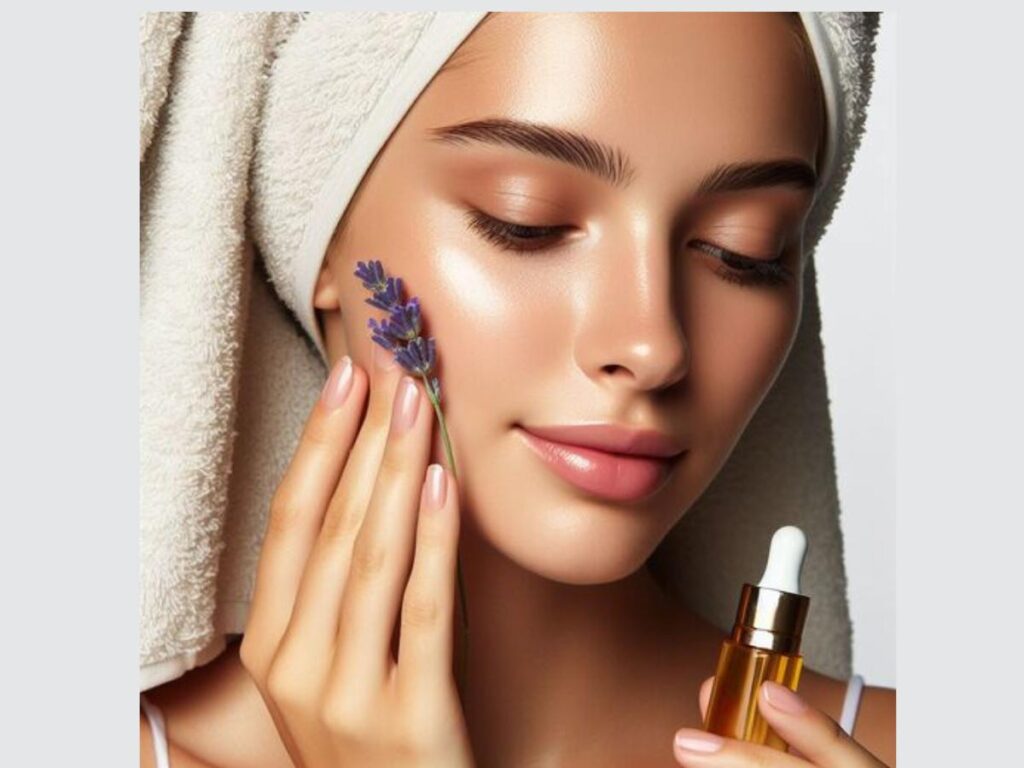
Create Image in Canva Pro
Lavender oil has been used for ages due to its therapeutic and aromatic characteristics. It has a long history of use in various cultures, including ancient Egypt, Greece, and Rome. Traditionally, lavender oil was valued for its calming effects and its ability to promote relaxation.
The efficacy of lavender oil can be attributed to its complex chemical composition. It contains over 100 active compounds, including linalool, linalyl acetate, and camphor. Each component contributes to the oil’s therapeutic effects, such as its anti-inflammatory and antimicrobial properties.
Skin Benefits of Lavender Oil
Lavender oil offers several benefits for skin tightening and promoting a more youthful appearance:
- Lavender oil helps balance the skin’s pH levels, which is crucial for maintaining healthy, firm skin. By regulating pH, it prevents excessive oil production and helps tighten pores, resulting in smoother, more refined skin texture.
- The astringent properties of lavender oil make it effective in tightening enlarged pores. When applied topically, it causes the skin to contract, reducing the appearance of large pores and giving the skin a firmer, more toned appearance.
- Regular use of lavender oil can help reduce the appearance of sagging skin, especially around the cheeks and jawline. Its toning properties improve skin elasticity, making it appear firmer and more lifted over time.
- Lavender oil promotes collagen production, which is essential for maintaining skin elasticity and firmness. By stimulating collagen synthesis, it helps prevent sagging and wrinkles, resulting in tighter, more resilient skin.
- The antioxidant properties of lavender oil help protect the skin from environmental damage and oxidative stress, which can lead to premature aging. By neutralizing free radicals, it helps preserve the skin’s youthful appearance and prevents sagging and loss of firmness.
- Lavender oil’s moisturizing properties help hydrate the skin and plump up fine lines and wrinkles, making them less noticeable. Regular application can soften the appearance of wrinkles and promote a smoother, more youthful complexion.
- Lavender oil promotes the regeneration of skin cells, which is essential for maintaining firm, healthy skin. By speeding up the turnover of old skin cells and promoting the growth of new ones, it helps maintain skin tightness and prevents sagging and drooping.
- Regular use of lavender oil can improve overall skin texture, making it appear smoother, firmer, and more refined. Its toning and balancing properties help minimize imperfections and give the skin a more youthful and radiant appearance.
Components Used to Prepare the Oil Mix
Key Ingredients:
- Lavender Oil
- Rosehip Oil
What You Must Do:
- Mix a few drops of each oil with a carrier oil and apply to the face and neck as part of your skincare routine
2. Frankincense Oil
Frankincense oil, often hailed as the ‘King of Oils,’ has a rich history dating back thousands of years. Originating from the resin of the Boswellia tree, which is native to the Arabian Peninsula and parts of Africa, this aromatic oil has been cherished for its fragrance and medicinal qualities. Today, it’s celebrated not just for its use in religious ceremonies but also for its numerous health benefits, particularly for the skin.
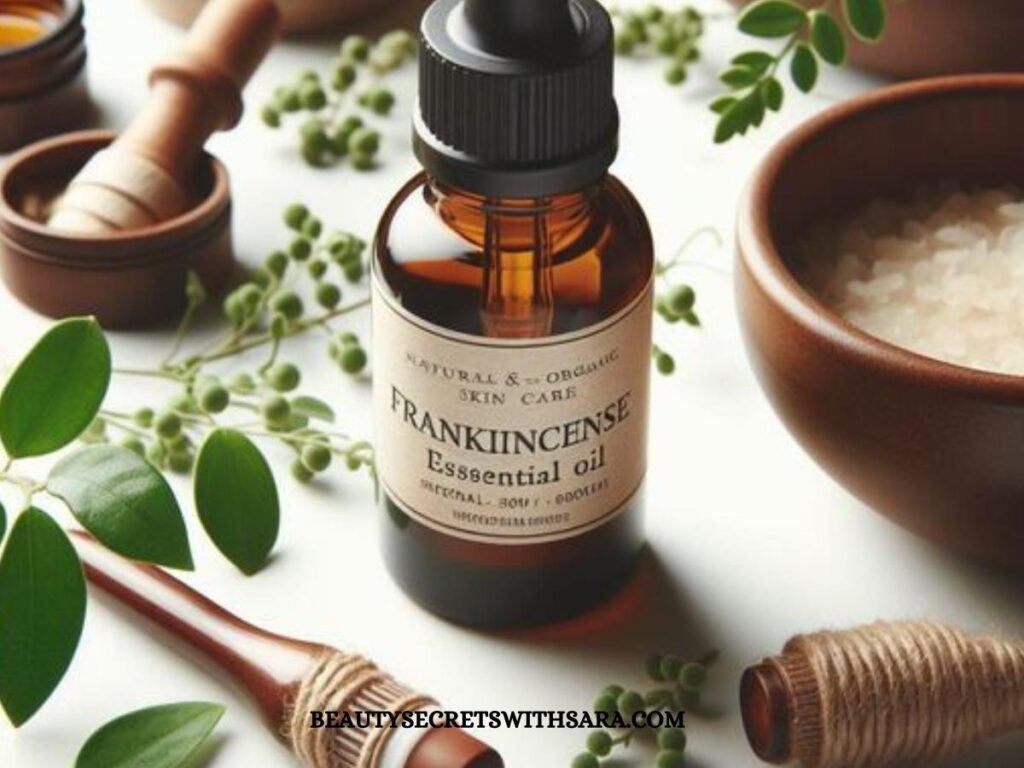
Create Image in Canva Pro
The magic of frankincense oil lies in its complex composition, rich in terpenes, esters, and ketones. These components are the powerhouses behind the oil’s renowned health benefits, including its skin rejuvenating properties.
Frankincense Oil Skin Benefits
Frankincense oil offers a bounty of benefits for the skin, making it a prized component in many skincare formulations.
- One of the most cherished effects of frankincense oil is its ability to moisturize and nourish the skin deeply. Unlike conventional moisturizers that might clog pores, frankincense oil offers hydration without the heaviness.
- Rich in antioxidants, frankincense oil is a warrior against the signs of aging. It helps in reducing the appearance of wrinkles, fine lines, and skin laxity, promoting a youthful and radiant complexion.
- Frankincense oil is a boon for inflamed skin, offering soothing relief. Its anti-inflammatory properties make it ideal for treating conditions like eczema, psoriasis, and dermatitis. Additionally, its healing qualities accelerate the repair of minor cuts, acne scars, and blemishes.
- The antiseptic and antibacterial nature of frankincense oil makes it effective in combating acne-causing bacteria, reducing breakouts, and maintaining clear skin.
Components Used to Prepare the Oil Mix
Here’s a step-by-step guide to effectively use Frankincense Oil alongside other essential oils for topical application:
Step 1: Choose Your Essential Oil Blend
First, determine your skin’s needs to select complementary oils that work well with Frankincense Oil. For instance:
- For Hydration: Combine with Lavender Oil and a carrier oil like Jojoba Oil.
- For Anti-Aging: Mix with Rosehip Oil, which is rich in antioxidants.
- For Acne Control: Blend with Tea Tree Oil for its antimicrobial properties.
Step 2: Dilute with a Carrier Oil
Essential oils are potent and should be diluted with a carrier oil to prevent skin irritation. Good carrier oils include Jojoba, Coconut, Almond, or Rosehip Oil. A general rule for skin applications is to maintain a 2% essential oil concentration. This means adding approximately 12 drops of essential oil (Frankincense and your chosen essential oil combined) per ounce (30 ml) of carrier oil.
Step 3: Perform a Patch Test
Before applying the blend to your face or body, perform a patch test to ensure you don’t have an allergic reaction. Apply a small amount of the blend to the inside of your wrist or elbow and wait for 24 hours. If irritation occurs, discontinue use or try a different blend.
Step 4: Apply the Blend
Once your blend has passed the patch test, you’re ready to apply it to your skin. Here’s how:
- Cleanse your skin thoroughly to remove impurities and allow for better absorption of the oil.
- Apply a few drops of the blend to your fingertips or directly onto your skin. For the face, 3-5 drops should suffice; for the body, you may need more depending on the area covered.
- Gently massage Massage the oil into your skin in circular motions until completely absorbed. Pay extra attention to trouble areas, but avoid sensitive parts like the eyes.
Pro Tips: Store your oil blend in a dark, glass bottle away from direct sunlight to preserve its potency.
Step 5: Use Consistently
For the best results, incorporate your Frankincense oil blend into your daily skincare routine. Applying it in the evening can be particularly beneficial, as this allows the oils to work on repairing and rejuvenating your skin overnight.
3. Tea Tree Oil
Tea tree oil, derived from the leaves of the Melaleuca alternifolia plant native to Australia, has gained immense popularity in skincare routines due to its numerous benefits. Its natural characteristics make it a valuable component for a variety of skin issues.
What is Tea Tree Oil? Tea tree oil is an essential oil extracted from the leaves of the Melaleuca alternifolia plant through steam distillation. It contains over 100 different components, primarily terpinen-4-ol, which is responsible for its antimicrobial effects.
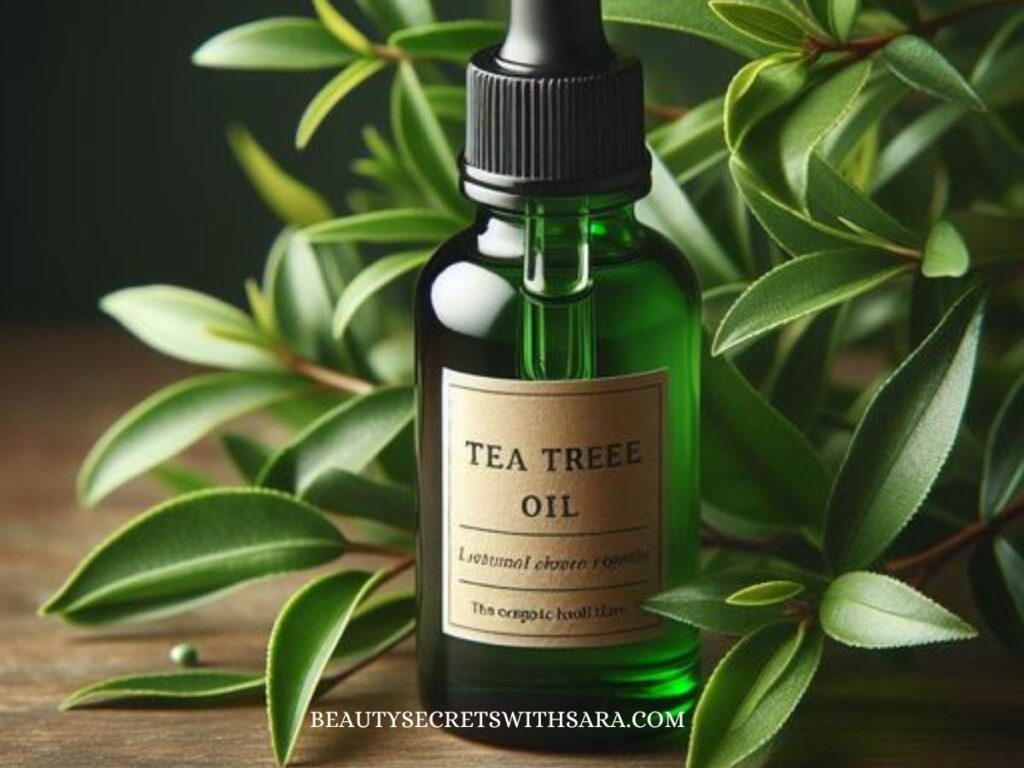
Create Image in Canva Pro
Tea tree oil, also known as melaleuca oil, has been used for centuries by indigenous Australians for its medicinal properties. It gained prominence in modern skincare due to its potent antibacterial, antifungal, and anti-inflammatory properties.
History of Tea Tree Oil? Indigenous Australians have long used tea tree leaves for medicinal purposes, including treating wounds and skin infections. The commercial production of tea tree oil began in the 1920s, and its popularity has since grown worldwide.
Tea Tree Oil Skin Benefits
- One of the most well-known benefits of tea tree oil is its effectiveness in treating acne. Its antibacterial properties help kill acne-causing bacteria on the skin, reducing inflammation and preventing breakouts.
- Despite its potent antimicrobial properties, tea tree oil is gentle on the skin and can help moisturize dry skin without clogging pores. It controls oil production, making it appropriate for oily and mixed skin types.
- Tea tree oil’s anti-inflammatory properties make it effective in reducing redness, swelling, and irritation associated with various skin conditions, including eczema and psoriasis.
- Tea tree oil’s powerful antibacterial and antifungal properties make it effective in treating fungal infections like athlete’s foot and nail fungus. It can also prevent bacterial infections on minor cuts and wounds.
Components Used to Prepare the Oil Mix
Here’s how you can effectively combine lavender oil with other essential oils:
How to Apply:
Mix tea tree oil with lavender oil and jojoba oil for a potent acne-fighting serum. Combine 2-3 drops of tea tree oil, 2 drops of lavender oil, and 1 tablespoon of jojoba oil in a small dropper bottle. Apply a few drops to clean, dry skin before moisturizing to target acne and reduce inflammation.
4. Geranium Oil
Geranium oil, derived from the leaves and stems of the Geranium plant, has been utilized for centuries for its various medicinal and therapeutic properties. Among its many uses, geranium oil is gaining popularity in skincare due to its numerous benefits.
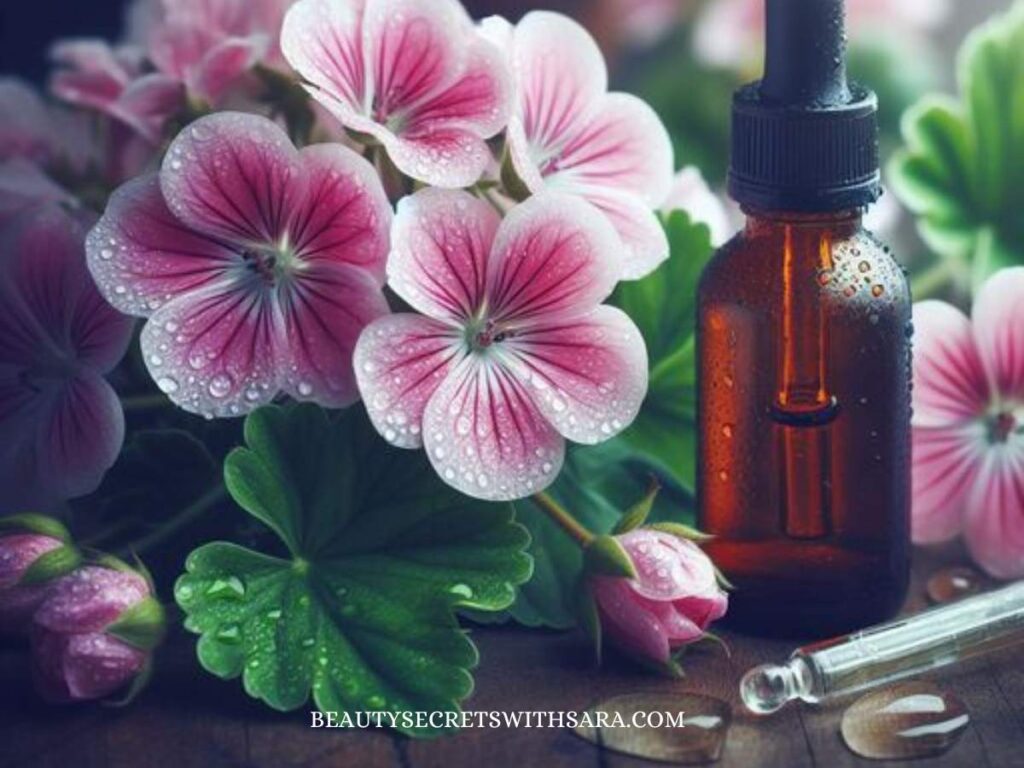
Create Image in Canva Pro
In the realm of natural remedies and holistic skincare, geranium oil often takes center stage for its myriad benefits. While its pleasant floral scent is widely cherished, its potential to tighten and rejuvenate the skin often goes overlooked. Geranium oil, derived from the geranium plant’s fragrant leaves and flowers, boasts a remarkable array of properties that can promote skin health and combat signs of aging.
Get to Know It: Geranium Oil Geranium oil contains compounds such as citronellol, geraniol, and linalool, which contribute to its distinct aroma and therapeutic effects. These compounds exhibit antibacterial, anti-inflammatory, and antioxidant properties, making geranium oil a versatile ingredient for skincare.
Geranium Oil Skin Benefits
- Geranium oil possesses potent astringent properties, making it a valuable asset in skincare routines aimed at tightening loose or sagging skin. Astringents work by causing the skin tissues to contract, resulting in a firmer appearance. When applied topically, geranium oil can help minimize the appearance of enlarged pores and improve overall skin texture, contributing to a more toned and youthful complexion.
- Collagen, a protein abundant in the skin, is responsible for its firmness and elasticity. However, as we age, collagen production declines, leading to sagging skin and the formation of wrinkles. By incorporating geranium oil into your skincare routine, you can support the skin’s natural collagen production process and maintain a more youthful appearance.
- Free radicals, unstable molecules generated by environmental stressors like UV radiation and pollution, can wreak havoc on the skin, leading to premature aging and loss of elasticity. Geranium oil is rich in antioxidants, such as flavonoids and phenolic compounds, which help neutralize free radicals and protect the skin from oxidative damage. By shielding the skin from external aggressors, geranium oil aids in preserving its firmness and preventing the formation of fine lines and wrinkles.
- Excessive oiliness or dryness can exacerbate skin concerns such as acne and premature aging. Geranium oil possesses balancing properties that help regulate sebum production, making it beneficial for all skin types, including oily, dry, and combination skin. By maintaining optimal sebum levels, geranium oil promotes a healthy skin barrier and prevents conditions that can contribute to skin laxity.
- Proper blood circulation is essential for delivering oxygen and nutrients to the skin cells, promoting cell turnover, and maintaining skin health. Geranium oil has been shown to improve blood circulation when applied topically, which can enhance the skin’s vitality and radiance. By supporting efficient circulation, geranium oil contributes to a more vibrant complexion and helps combat the dullness associated with aging skin.
How to Apply:
Carrier oil such as jojoba, sweet almond, or rosehip oil, and add a few drops of geranium oil along with complementary essential oils like lavender, frankincense, or rosemary. Mix well and apply to clean, damp skin in gentle, upward motions. This serum can help tighten and rejuvenate the skin while providing hydration and nourishment.
5. Myrrh Oil
Myrrh oil, derived from the resin of the Commiphora myrrha tree, has been treasured for its medicinal and cosmetic properties for centuries. Among its many benefits, one notable advantage is its ability to tighten the skin, promoting a more youthful and radiant complexion.
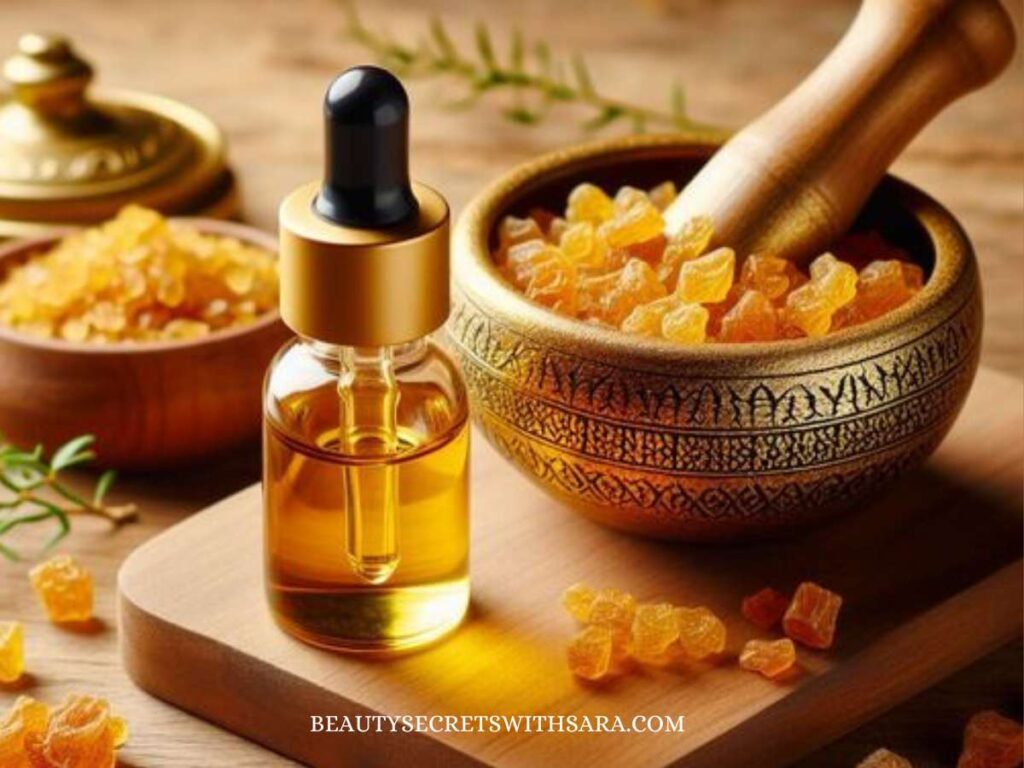
Image in Canva Pro
Get to Know It: Myrrh Oil Myrrh oil contains various bioactive compounds, including sesquiterpenoids, which possess antioxidant, anti-inflammatory, and antimicrobial properties. These compounds work synergistically to rejuvenate the skin and promote overall skin health.
Myrrh Oil Skin Benefits
- Myrrh oil stimulates fibroblasts, the cells responsible for producing collagen and elastin, leading to firmer, more supple skin.
- The antioxidant compounds in myrrh oil help neutralize free radicals, preventing oxidative stress and preserving the skin’s youthful appearance.
- Myrrh oil possesses anti-inflammatory properties, reducing inflammation and redness, and promoting a smoother complexion.
- Myrrh oil helps lock in moisture, keeping the skin hydrated and plump, reducing the appearance of fine lines and wrinkles.
How to Apply:
Add the desired amount of carrier oil (based on how much you intend to use). Then, add 1-2 drops of myrrh oil along with 1-2 drops of your chosen essential oils. You can adjust the number of drops based on your preference and the specific benefits you’re targeting.
Precautions and Side Effects
While myrrh oil is generally safe for topical use, it may cause skin irritation in some individuals, especially those with sensitive skin. Always perform a patch test before using myrrh oil, and dilute it with a carrier oil if necessary. Avoid using myrrh oil during pregnancy or if you have a history of skin allergies.
6. Neroli Oil
Neroli oil, derived from the blossoms of the bitter orange tree, Citrus aurantium, has been prized for centuries for its therapeutic properties. It’s widely used in aromatherapy and skincare due to its delightful fragrance and numerous benefits for the skin.

Image in Canva Pro
Get to Know It: Neroli Oil Neroli oil is rich in antioxidants, vitamins, and essential oils, including citral, limonene, and linalool. These components contribute to its rejuvenating and skin-nourishing properties.
Neroli Oil Skin Benefits
- The citral and limonene in neroli oil stimulate collagen synthesis, promoting firmer and more youthful-looking skin.
- Regular use of neroli oil improves skin elasticity, making it appear smoother and more supple.
- Neroli oil’s antioxidant properties help to reduce the signs of aging, such as wrinkles and fine lines, by neutralizing free radicals.
- By tightening and toning the skin, neroli oil helps prevent sagging and drooping, particularly in areas prone to loss of firmness.
- Neroli oil evens out skin tone and texture, leaving it radiant and glowing.
How to Apply:
Select other essential oils that complement the benefits of neroli oil and suit your skin type. For example, lavender oil is calming and suitable for all skin types, while tea tree oil is great for acne-prone skin.
7. Almond Oil
Almond oil, derived from the seeds of the almond tree, has been a staple in skincare routines for centuries. Its natural properties make it a popular choice for various skin concerns, including tightening and firming. Almond oil is rich in vitamins E, A, and D, as well as essential fatty acids, making it highly nourishing for the skin. It’s lightweight and easily absorbed, making it suitable for all skin types.
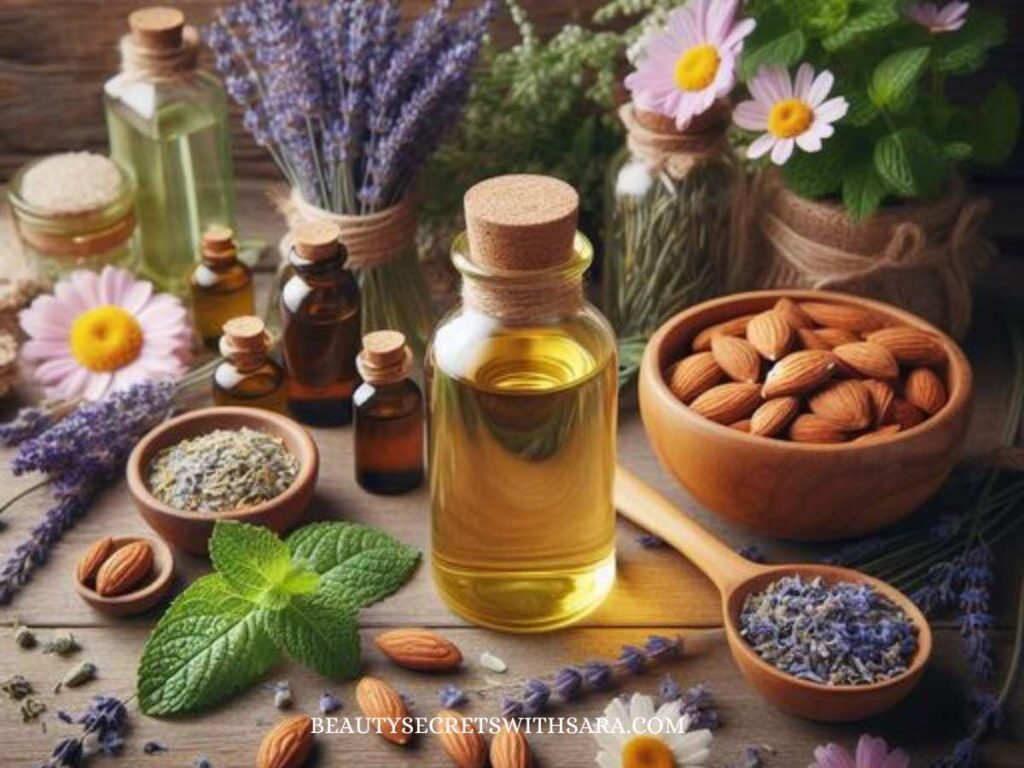
Image in Canva Pro
Skin tightening refers to the process of firming and toning the skin to reduce sagging and improve elasticity. As we age, our skin loses collagen and elastin, leading to wrinkles and sagging skin.
Get to Know It: Nutritional Composition of Almond Oil Almond oil contains vitamins and minerals that are essential for healthy skin, including: i) Vitamin E: A powerful antioxidant that protects the skin from free radical damage. ii) Vitamin A: Helps to stimulate cell turnover and promote collagen production. iii) Vitamin D: Supports skin cell growth, repair, and metabolism
Almond Oil Skin Benefits
- Almond oil deeply penetrates the skin, providing long-lasting hydration and preventing moisture loss.
- The vitamins and nutrients in almond oil promote collagen production, which helps to improve skin elasticity and firmness.
- Almond oil is rich in antioxidants, which help to protect the skin from free radical damage and premature aging.
- Regular use of almond oil can help to improve skin elasticity, reducing the appearance of sagging and wrinkles.
Components Used to Prepare the Oil Mix
To use almond oil and mix it with other essential oils for skin tightening, follow these simple steps:
- Choose Your Essential Oils: Select essential oils known for their skin-tightening properties. Some excellent options include lavender oil, rosehip oil, geranium oil, and frankincense oil.
- Dilution Ratio: Essential oils are potent and should be diluted before applying them to the skin. A common dilution ratio is 1-2% essential oil to carrier oil. For example, if you’re making a 1% dilution, you’ll need about 6 drops of essential oil per ounce of carrier oil.
- Select Carrier Oil: Almond oil serves as an excellent carrier oil due to its lightweight texture and skin-nourishing properties. Other carrier oils you can use include jojoba oil, coconut oil, or argan oil.
- Mixing: In a clean, dark-colored glass bottle, add your desired amount of almond oil. Then, add the selected essential oils based on your preferred dilution ratio. Close the bottle tightly and shake well to mix the oils thoroughly.
- Patch Test: Before applying the oil blend to a larger area of your skin, perform a patch test. Apply a small amount of the diluted oil to the inside of your forearm and wait 24 hours to check for any adverse reactions.
- Application: Once the patch test is successful, you can proceed to apply the oil blend to your skin. Wash your face with a gentle cleanser and pat it dry. Then, take a small amount of the oil blend and massage it onto your face and neck using upward motions.
- Massage Technique: Massage the oil into your skin gently, using circular motions to promote absorption and stimulate blood flow. Pay extra attention to areas prone to sagging, such as the jawline, cheeks, and neck.
- Frequency: For best results, use the almond oil and essential oil blend for skin tightening twice daily, in the morning and evening, as part of your skincare routine.
- Consistency: Consistency is key when it comes to seeing results. Incorporate the oil blend into your skincare regimen and use it regularly to experience the full benefits of skin tightening.
- Monitor Results: Keep track of any changes in your skin’s texture, firmness, and overall appearance. With consistent use, you should notice improvements in skin tightness and elasticity over time.
8. Cypress Oil
Cypress oil, derived from the branches of the cypress tree, has been utilized for centuries for its various health and wellness benefits. With its woody aroma and potent properties, it has gained popularity in skincare routines for its ability to tighten and firm the skin.
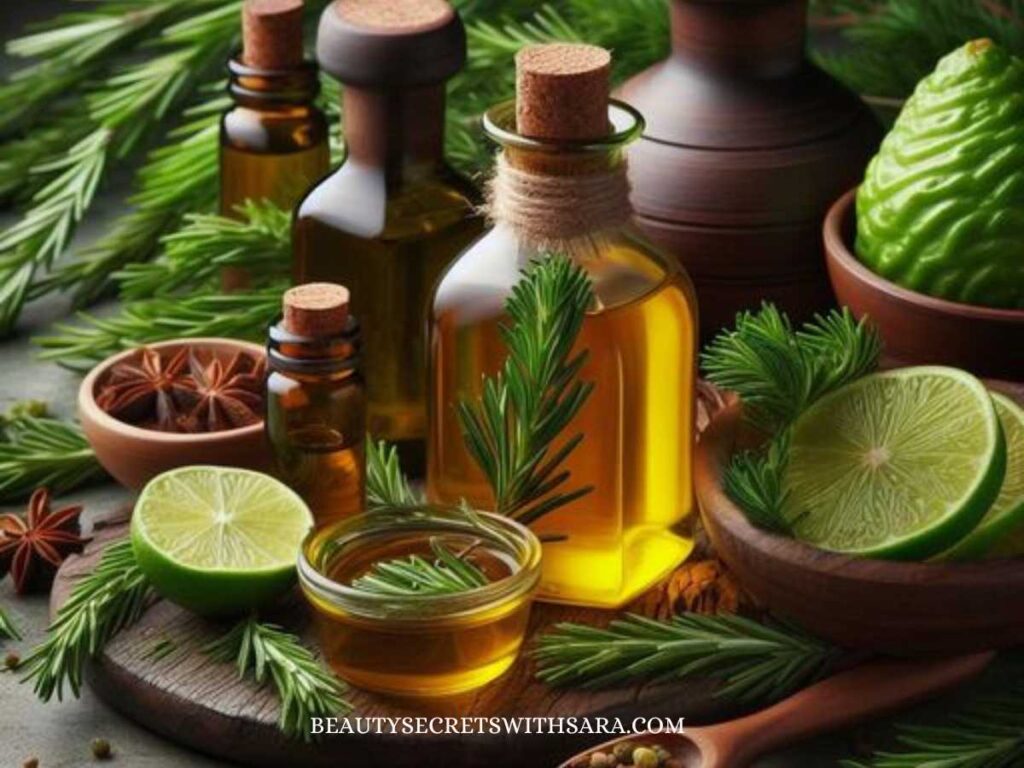
Image in Canva Pro
As we age, our skin naturally loses elasticity and firmness, leading to sagging and wrinkles. Factors such as sun exposure, pollution, and lifestyle habits can accelerate this process. Skin tightening is essential to maintain a youthful appearance and promote overall skin health.
Get to Know It: Properties of Cypress Oil Cypress oil is rich in antioxidants and exhibits powerful anti-inflammatory properties. Additionally, it has astringent qualities, making it effective in toning and tightening the skin.
Cypress Oil Skin Benefits
- Regular use of Cypress oil can lead to a reduction in the appearance of fine lines and wrinkles. It improves skin elasticity, making it look firmer and more youthful. Additionally, Cypress oil helps minimize sagging skin, particularly around the jawline and neck area.
- Several studies support the efficacy of Cypress oil for skin tightening. Clinical trials have demonstrated its ability to improve skin firmness and elasticity with continued use.
Components Used to Prepare the Oil Mix
To enhance its effectiveness, Cypress oil can be blended with other skincare ingredients such as rosehip seed oil or frankincense essential oil. These combinations provide additional benefits and synergistically work to tighten and tone the skin.
9. Rosemary Oil
Rosemary oil, derived from the aromatic herb Rosemary (Rosmarinus officinalis), has been treasured for centuries for its various health and beauty benefits. Among its many uses, rosemary oil is gaining popularity for its remarkable skin tightening properties.
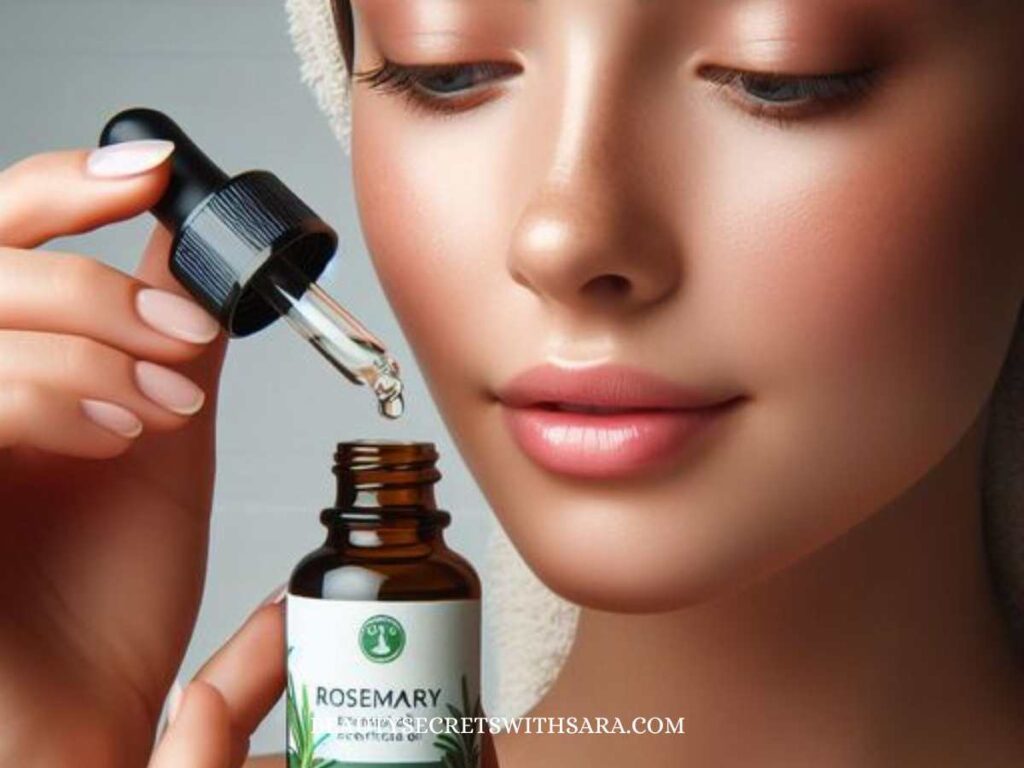
Image in Canva Pro
Before delving into the benefits of rosemary oil for skin tightening, it’s essential to understand the factors that contribute to skin aging. External factors such as sun exposure, pollution, and lifestyle choices, along with internal factors like genetics and hormonal changes, all play a role in the aging process.
Get to Know It: Rosemary Oil Rosemary oil is rich in antioxidants, antimicrobial, and anti-inflammatory properties, making it a potent natural remedy for various skin concerns. Its primary components include rosmarinic acid, caffeic acid, and essential nutrients like iron, calcium, and vitamins.
Rosemary Oil Skin Benefits
- Rosemary oil promotes blood circulation, which helps deliver essential nutrients to the skin cells, promoting cell regeneration and overall skin health.
- The high antioxidant content in rosemary oil helps neutralize free radicals, reducing oxidative stress and preventing premature aging signs like wrinkles and fine lines.
- Rosemary oil stimulates collagen production, a vital protein responsible for maintaining skin elasticity and firmness. Increased collagen levels result in tighter, more youthful-looking skin.
- Regular application of rosemary oil helps tighten and tone the skin, reducing sagging and improving overall skin texture and appearance.
Components Used to Prepare the Oil Mix
When using rosemary oil for skin tightening, it’s crucial to dilute it with a carrier oil like coconut or jojoba oil to avoid skin irritation. Here’s a simple DIY recipe:
- Combine 2-3 drops of rosemary oil with one tablespoon of carrier oil.
- Apply the mixture to cleansed skin using gentle upward motions.
- Leave it on for 15-20 minutes, then rinse with lukewarm water.
For the greatest results, include this method in your skincare routine 2-3 times per week.
10. Jasmine Oil
Jasmine oil, derived from the delicate white flowers of the jasmine plant, has long been cherished for its enchanting aroma and numerous health and skincare benefits. In the realm of skincare, jasmine oil stands out for its remarkable ability to tighten and rejuvenate the skin, making it a popular choice for those seeking natural solutions for age-related concerns.
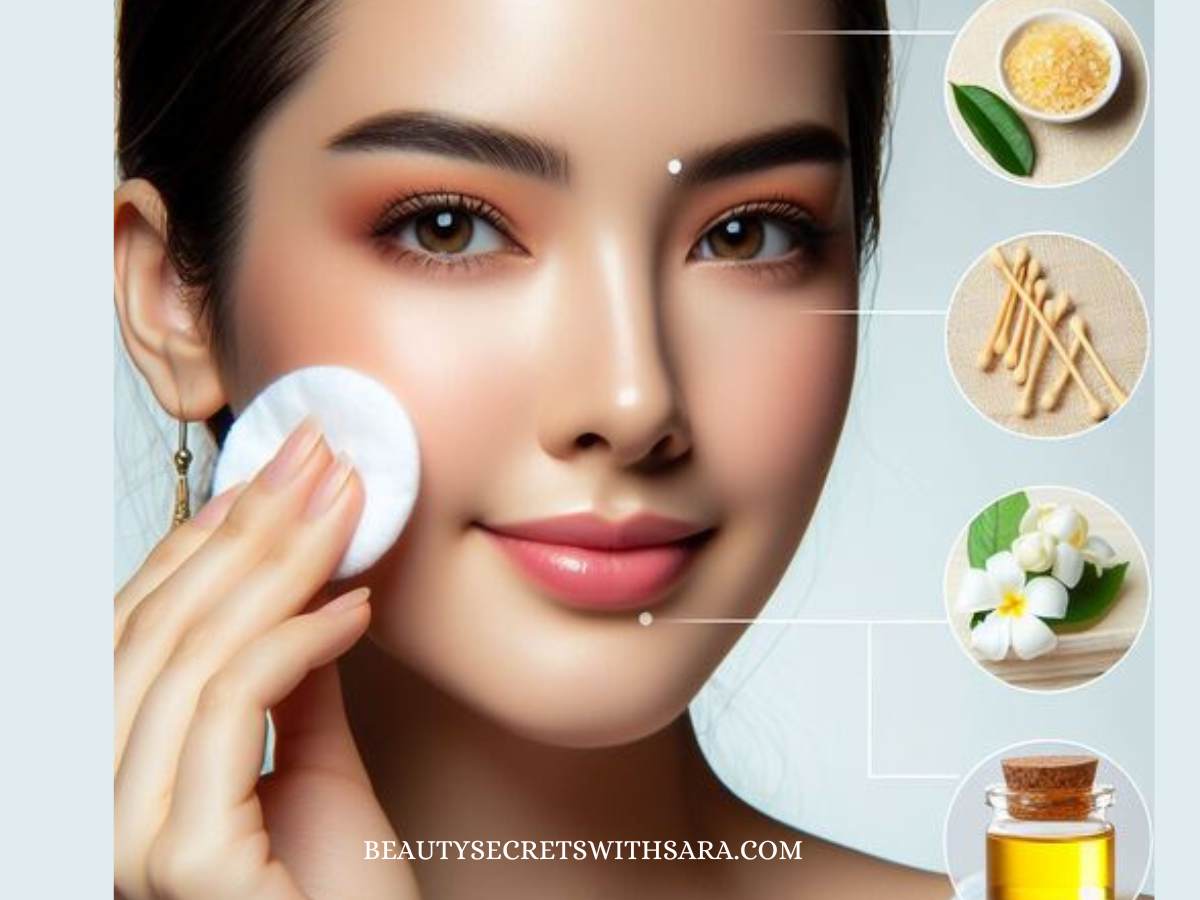
Image in Canva Pro
The Science Behind Jasmine Oil Jasmine oil contains various compounds known for their skincare benefits, including benzyl acetate, benzyl alcohol, and linalool. These components possess moisturizing, soothing, and anti-inflammatory properties that contribute to healthier, more resilient skin. Additionally, jasmine oil stimulates collagen production, thereby improving skin elasticity and firmness.
Jasmine Oil Skin Benefits
- One of the most sought-after benefits of jasmine oil is its ability to diminish the appearance of fine lines and wrinkles. Thanks to its potent anti-aging properties, jasmine oil helps smooth out skin texture and reduce the depth of wrinkles, resulting in a more youthful complexion.
- Skin elasticity is crucial for maintaining a youthful appearance and preventing sagging. Jasmine oil enhances skin elasticity by promoting collagen and elastin production, leading to tighter, more resilient skin over time.
- In addition to its skin tightening effects, jasmine oil provides deep hydration and nourishment to the skin. Its emollient properties help lock in moisture, keeping the skin soft, supple, and radiant. Regular application of jasmine oil can help address dryness and improve overall skin texture.
- Sagging skin is a common concern associated with aging, but jasmine oil can help combat this issue by promoting skin firmness and elasticity. By stimulating collagen synthesis and supporting skin structure, jasmine oil helps prevent sagging and maintain a youthful appearance.
How to Apply
Jasmine oil can be incorporated into your skincare routine in various ways. You can apply it directly to the skin after cleansing, or mix a few drops with your favorite moisturizer or facial oil. Massage the oil gently into the skin using upward motions to promote absorption and enhance its skin tightening effects. For best results, use jasmine oil regularly as part of your morning or evening skincare routine.
11. Lemon Oil
In the pursuit of youthful, radiant skin, nature often holds the key to effective solutions. Among the plethora of natural remedies, lemon oil stands out for its remarkable skin-tightening benefits. Extracted from the peel of fresh lemons, lemon oil is renowned for its potent antioxidant properties and high concentration of vitamins and minerals that work wonders for the skin.
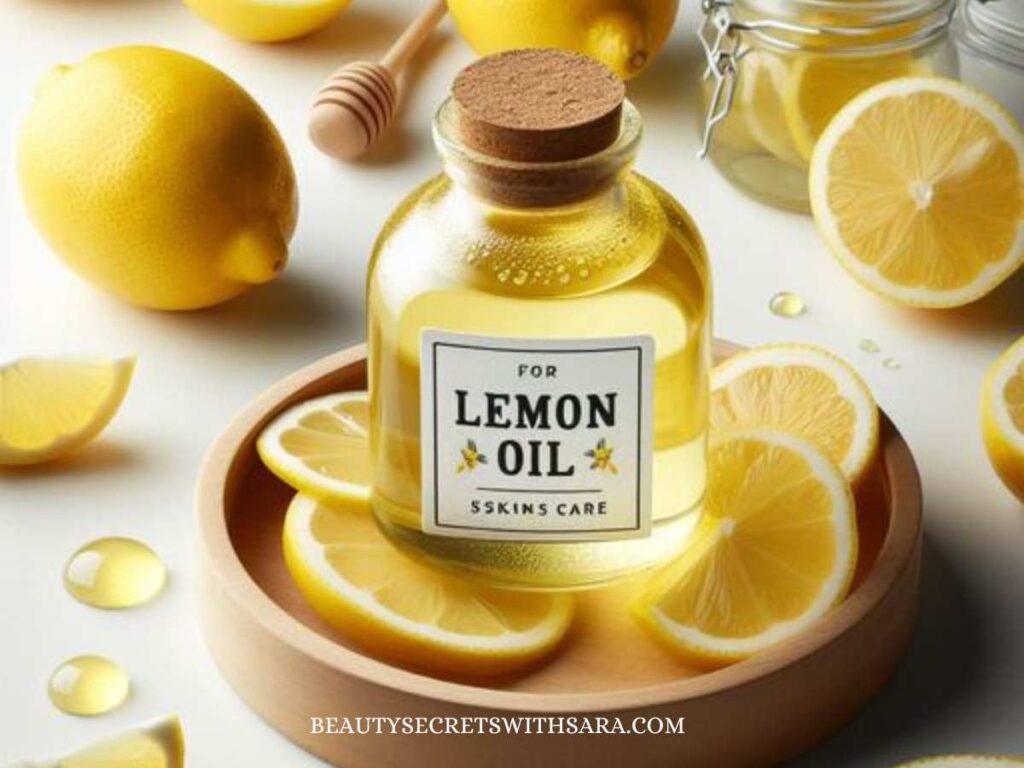
Image in Canva Pro
Lemon Oil Skin Benefits
- Lemon oil is rich in antioxidants, particularly vitamin C, which plays a crucial role in combating free radical damage. Free radicals, generated by factors like UV radiation, pollution, and stress, contribute to premature aging by breaking down collagen and elastin fibers in the skin. By neutralizing free radicals, lemon oil helps protect the skin’s structural integrity, preventing sagging and promoting a firmer, more resilient appearance.
- Collagen is the protein responsible for maintaining the skin’s firmness and elasticity. As we age, collagen production gradually decreases, resulting in sagging and wrinkles. Lemon oil contains compounds that stimulate collagen synthesis, helping to restore the skin’s youthful suppleness. Regular application of lemon oil can promote collagen production, resulting in visibly tighter and smoother skin over time.
- One of the key benefits of lemon oil for skin tightening lies in its astringent properties. Astringents work by constricting the skin tissues, temporarily reducing the appearance of pores and creating a smoother surface. This tightening effect can give the skin a firmer and more toned appearance, making lemon oil an excellent addition to skincare routines for those concerned with enlarged pores or loss of firmness.
- In addition to its skin-tightening effects, lemon oil is prized for its ability to brighten and even out the skin tone. The high concentration of vitamin C in lemon oil helps inhibit melanin production, the pigment responsible for dark spots and discoloration. By reducing the appearance of hyperpigmentation and promoting cell turnover, lemon oil can impart a luminous, more youthful complexion.
- Dead skin cell buildup can contribute to dullness and uneven texture, making the skin appear less firm and youthful. Lemon oil contains natural alpha hydroxy acids (AHAs) such as citric acid, which gently exfoliate the skin, sloughing away dead cells and promoting cell renewal. Regular exfoliation with lemon oil can reveal smoother, tighter skin and enhance the effectiveness of other skincare products.
How to Apply
How to Use Lemon Oil for Skin Tightening:
- Dilute lemon oil with a carrier oil such as jojoba oil or sweet almond oil to prevent skin irritation.
- Perform a patch test before using lemon oil to ensure compatibility with your skin.
- Add a few drops of diluted lemon oil to your favorite moisturizer or serum and apply to the face and neck.
- For a refreshing facial mist, mix diluted lemon oil with distilled water in a spray bottle and spritz onto the skin throughout the day.
- Incorporate lemon oil into your weekly skincare routine by using it as a natural exfoliant in DIY scrubs or masks.
Precautions:
- Lemon oil can increase the skin’s sensitivity to sunlight, so be sure to use sunscreen when using lemon oil during the day.
- Avoid applying undiluted lemon oil directly to the skin, as it may cause irritation or allergic reactions.
- If you have sensitive skin or a history of citrus allergies, consult with a dermatologist before using lemon oil.
12. Jojoba Oil
Jojoba oil, extracted from the seeds of the jojoba plant, has been a staple in skincare routines for centuries. Its versatility and numerous benefits make it a favorite among beauty enthusiasts worldwide. One of its lesser-known benefits is its ability to tighten the skin naturally, providing a youthful and radiant appearance.
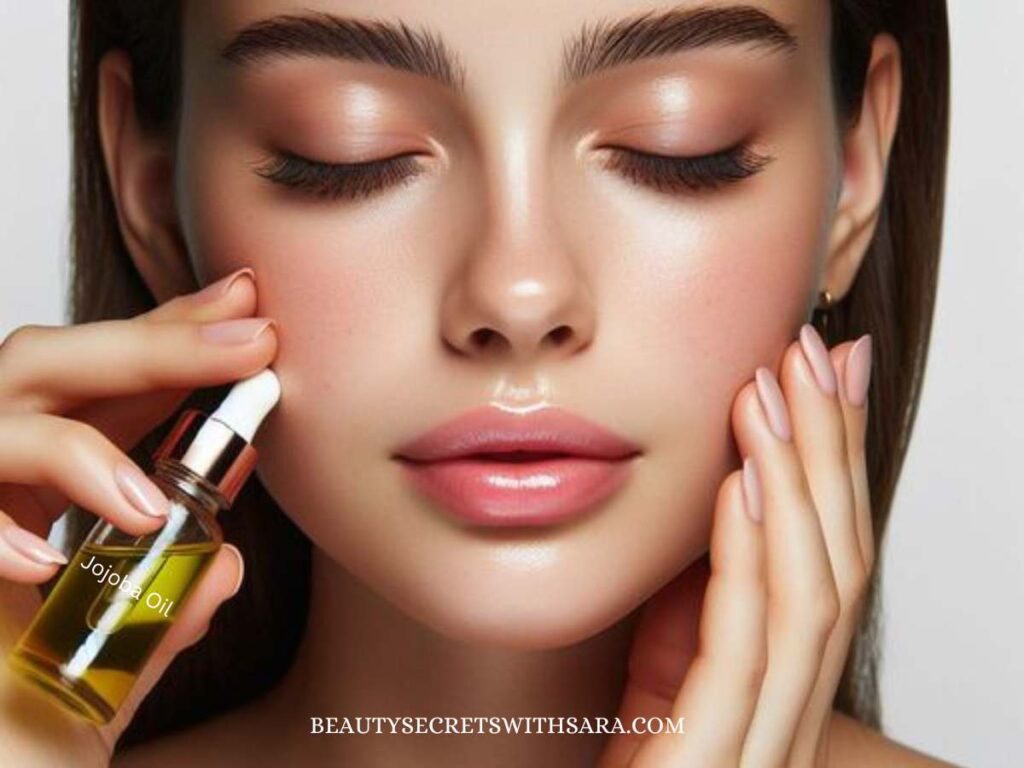
Image in Canva Pro
Nutritional Composition of Jojoba Oil: Jojoba oil is rich in vitamins E and B-complex, as well as essential fatty acids like omega-9 and omega-6. These nutrients nourish the skin from within, promoting cell regeneration and repair.
Jojoba Oil Skin Benefits
- Jojoba oil mimics the skin’s natural oils, providing intense hydration without clogging pores.
- The antioxidants in jojoba oil help protect the skin from free radical damage, preventing premature aging.
- Jojoba oil stimulates collagen synthesis, leading to firmer and more elastic skin.
- Regular use of jojoba oil can improve the skin’s elasticity, reducing sagging and promoting a youthful appearance.
How to Apply
- Direct Application: Simply apply a few drops of jojoba oil to clean, damp skin and massage gently until absorbed.
- Mixing with Other Oils: Jojoba oil can be combined with other essential oils like rosehip or lavender for added benefits.
- DIY Face Masks: Create a homemade face mask by mixing jojoba oil with ingredients like honey, yogurt, or avocado for a luxurious treat for your skin.
How to Use Essential Oils Safely
While essential oils offer numerous benefits for skin tightening, it’s crucial to use them safely. Always dilute essential oils with a carrier oil before applying them to the skin and perform a patch test to check for any adverse reactions. Additionally, consider the method of application, such as topical use or aromatherapy.
DIY Recipes for Skin Tightening
For a customized approach to skin tightening, consider creating your own DIY blends using essential oils. A facial serum, body oil blend, or massage blend can be tailored to your skin’s specific needs, providing targeted firming and toning benefits.
Other Tips for Skin Tightening
In addition to using essential oils, adopting healthy lifestyle habits can further enhance skin tightening efforts. Stay hydrated, eat a balanced diet rich in antioxidants, and protect your skin from sun damage by wearing sunscreen daily. Incorporating regular exercise and stress management techniques can also contribute to overall skin health and vitality.
Key Conclusion
- The use of essential oils for skin tightening offers a natural and effective solution for achieving firmer, more youthful-looking skin.
- By incorporating the top 12 essential oils discussed in this article into your skincare routine, you can harness their potent properties to promote skin firmness and elasticity.
- Remember to prioritize safety when using essential oils and consult with a healthcare professional if you have any concerns or pre-existing skin conditions.
FAQs
Q1. Are essential oils safe for all skin types?
While essential oils offer many benefits, they can be potent and may cause irritation in some individuals, especially those with sensitive skin. It’s essential to dilute essential oils properly and perform a patch test before using them on larger areas of the skin.
Q2. How often should I use essential oils for skin tightening?
The frequency of use depends on individual skin sensitivity and the specific essential oils being used. Start with once or twice a week and adjust as needed based on your skin’s response.
Q3. Can essential oils replace traditional skincare products for skin tightening?
Essential oils can complement your existing skincare routine but may not entirely replace traditional products. They can enhance firming and toning effects when used in conjunction with moisturizers, serums, and other skincare products.
Q4. Can pregnant women use essential oils for skin tightening?
Pregnant women should consult with their healthcare provider before using essential oils, as some oils may not be safe during pregnancy. It’s essential to err on the side of caution and seek professional advice.
Q5. How long does it take to see results from using essential oils for skin tightening?
Results may vary depending on individual factors such as skin type, age, and the specific essential oils used. Consistent use over time is key to achieving noticeable improvements in skin firmness and elasticity.

